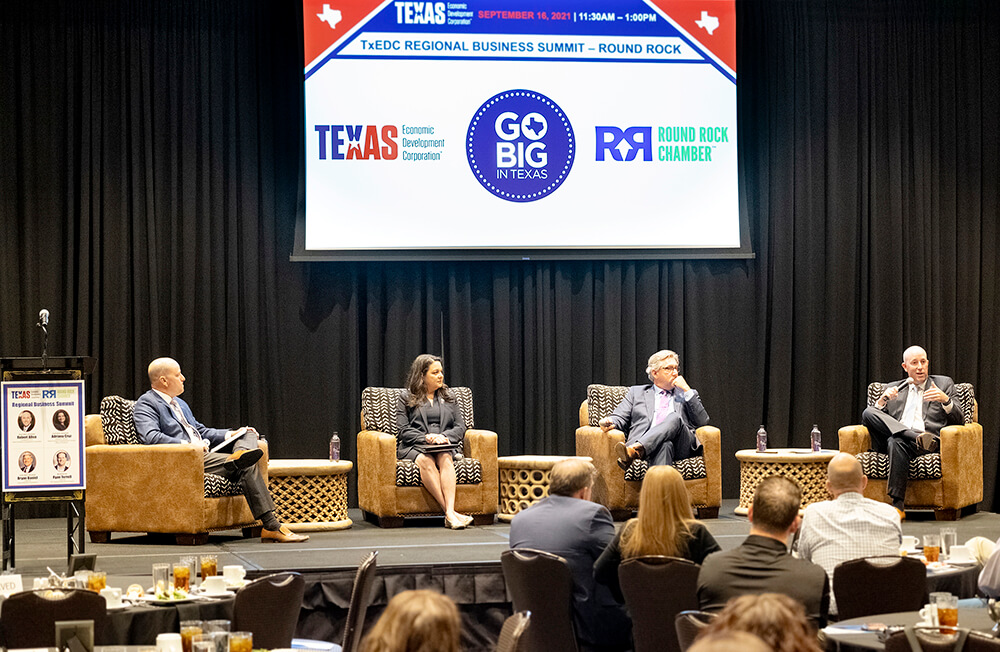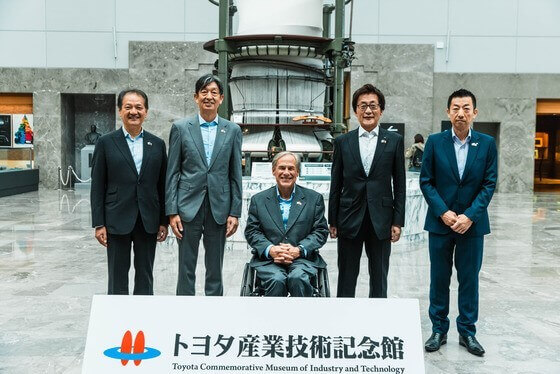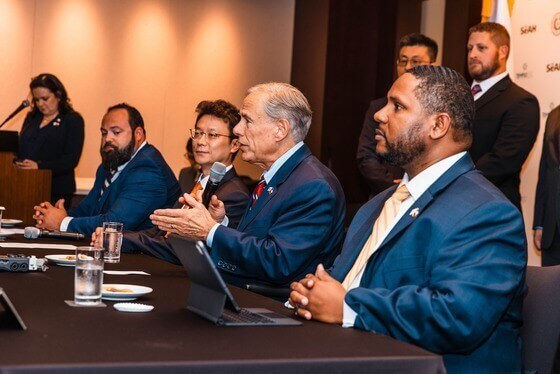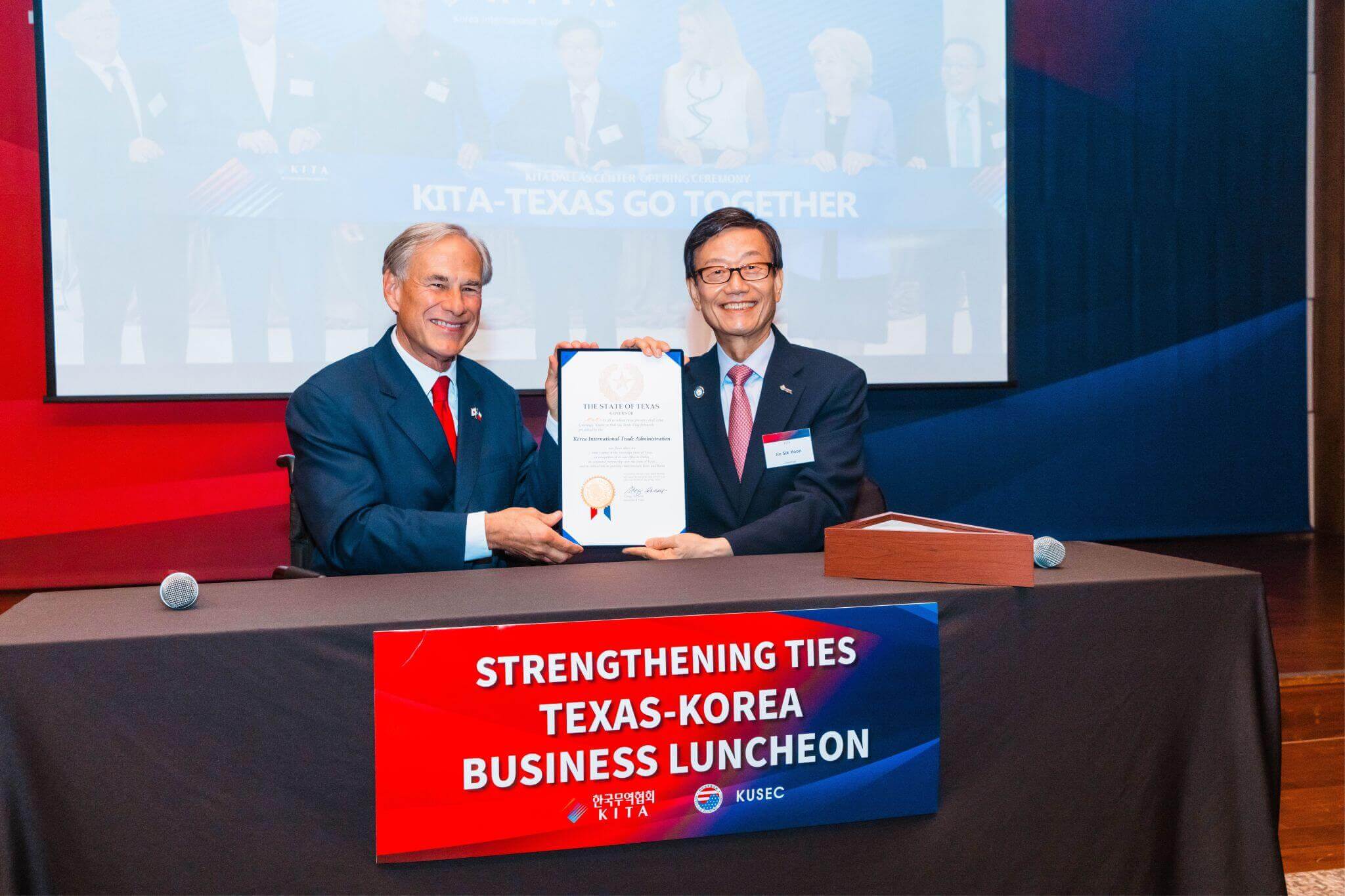ROUND ROCK, TEXAS — One of the fastest growing regions in Central Texas will continue to attract new jobs and capital investment because leadership has a plan to meet the challenges of population growth, said panelists at the 2021 Round Rock Regional Business Summit on Thursday.
The summit, hosted by the Texas Economic Development Corporation and the Round Rock Chamber of Commerce, brought together statewide economic development partners to discuss the future of Texas and the thriving community of Round Rock.
In 2020 alone, Round Rock created 1,115 new direct jobs and $46 million in capital investment, including the opening of Kalahari Resorts, site of the regional business summit.
Round Rock is recovering quickly from the impact of the COVID-19 global pandemic. As of June 2021, the unemployment rate in Round Rock was 3.9% compared to 5.9% for the state and 5.5% for the country.
What is the state of economic development in Texas?
Other regions in Texas are also growing at a rapid pace, said Adriana Cruz, Executive Director of the Governor’s Office of Economic Development and Tourism. Among them are the Dallas-Fort Worth metroplex and the Austin-San Antonio corridor.
“In my 20-something years in economic development, I have never seen the activity level we are seeing now,” Cruz said. “We’re just incredibly busy.”
In previous years, Texas had about 140 projects in the pipeline at any given time. At its peak in the past few months, the state has attracted 250 to 260 such projects. Cruz credited actions taken by Gov. Greg Abbott at the outset of the COVID-19 pandemic to safely reopen the state’s economy with making Texas attractive to CEOs.
“The phone started ringing,” she said, “and we started getting calls from CEOs across the country, saying, ‘My state is shut down. What Gov. Abbott is doing makes a lot of sense to me. It’s a very common sense approach, and I’m questioning why I’m located where I am.”
Cruz said she told these CEOs, “You need to be in Texas.”
There’s also been a shift in the types of projects Texas now attracts. These projects are larger in terms of job creation and capital investment and represent much more diversity in industry sectors. Cruz said there were currently 20 projects in Texas’s pipeline, representing more than $800 million in capital investment.
Gone to Texas: Why are companies leaving their states?
One driver, Cruz said, is Texas’s business-friendly climate, like the state’s reasonable regulatory environment. Some CEOs are leaving states where restrictive regulatory and business climates prevent them from being successful.
Cruz said one CEO relocating his business to Abilene from California told her, “Texas feels like home. Texas feels like a place where we can be a part of the community and where we can be successful. And where our employees can be successful.”
When businesses contact her office, Cruz said, she directs them to local and regional partners.
“When a prospect comes into town, a community partner makes sure the company connects with those key individuals who are going to help tell that community’s story. We’re always going to be there as a support and as a backup, but the story really comes from you,” she said.
How does population growth in Texas affect the workforce?
Texas is the fastest growing state in the nation, according to recent Census data. Companies are attracted to Texas because of its large — and younger — workforce.
The Texas Workforce Commission is looking for ways to ensure companies have a workforce pool that has the different skills and at the different levels they need, said Bryan Daniel, Chairman of the Texas Workforce Commission.
“Depending on what these companies are looking for, we’re looking for the best way to maintain or create that [workforce] pipeline for them,” Daniel said. “ So, naturally, we have to work a lot with the universities, the community colleges and even the high schools to ensure we’re . . .always meeting that expectation.”
One area of concern is training Texans in middle-level skills for jobs that require training but not necessarily a university degree. These jobs are, for example, found in the manufacturing of electric vehicles, computers, and other technology.
“For the companies we’re talking to, this [middle skills] seems to be the biggest concern,” Daniel said.
The partnership of universities, community colleges, training programs and high schools are working to provide employees interested in the middle-skills jobs the tools they need to qualify for them, he said.
Daniel praised Round Rock for creating a plan to manage and sustain growth while preparing its workforce to meet the needs of companies locating there.
“This city [Round Rock] as much as any other city has a real good handle on what they see for the out years of growth and how to really manage the expectations of employers. All in all, I’d say Round Rock is doing a great job at getting everyone employed but still adding jobs,” Daniel said.
Companies trust Round Rock’s plan to provide them with the workforce they’re looking for, he said.
What is the secret of Texas’s success?
Texas has a “verified track record of success” — nine consecutive Governor’s Cups, 17 years as the No. 1 state for business by Chief Executive Magazine, the world’s 9th largest economy if Texas were a country — which gives Texas “that street credibility” on a global level, said Robert Allen, President, and CEO of the Texas Economic Development Corporation.
This success is due to a variety of factors that include business climate, no state income tax, the nation’s second-largest workforce, lower cost of living, central location, energy sector, and its trade infrastructure. The state’s economy is also made up of widely diverse industry sectors.
The mission of TxEDC, as the privately funded partner of the publicly funded Office of Economic Development, is to market Texas to U.S. and international businesses as the world’s premier business location.
“What [our success] allows me to do as a marketing professional is to use that street credibility so that I don’t have to spend millions of dollars telling somebody who I am and where I’m from. I just get to say, ‘Hi, I’m from Texas,’” Allen said.
What challenges does Texas face?
But Texas also faces challenges to its No. 1 spot, and competition from other states is fierce. Allen said this is nothing new.
“Texas is no stranger to challenges. It’s part of what you get when coming to the state of Texas,” he said. “It’s what you get by being the best. What’s important is to stay focused on the core issues that are driving these decisions.”
Challenges to Texas’s continued success include infrastructure — the power grid and water availability — and education, skills training, and employee retention.
Other challenges include legislative action that draws negative media attention or eliminates incentive tools. In the past regular session, for example, the Legislature did not re-authorize Chapter 313, a significant incentive tool, which will expire on Dec. 31, 2022.
“One of the things I tell regional partners now is, ‘Put your foot on the gas. Get those applications in now. Speed up those projects,'” Allen said.
In the face of negative press, Allen said he reassures business leaders, “Nothing has changed. The core business reasons why you need to be doing business in the state of Texas — reasonable regulatory environment. . .favorable tax climate,. . .quality of life, safe, secure communities, good schools haven’t changed. These are the things that are going to drive decision-makers’ ultimate decisions on where they want to put that investment.”
What is the biggest threat to Texas’s future success?
Another significant challenge the panelists cited is, as Allen said, a “lackadaisical attitude” about the state’s future success.
“Texas has been the best state for business for a decade,” he said, which could cause Texans to be complacent. “That expectation of being on top. That’s the way we start kidding ourselves.”
Instead, those big projects will keep coming to Texas because of the hard work of statewide, regional, and local economic development professionals. Texas is up for any challenge with the support of strong regional partners like the Round Rock Chamber of Commerce.
“Working together, we can and will ensure that Texas remains the best state for business,” he said.



